Wir benötigen Ihre Einwilligung zur Verwendung der einzelnen Daten, damit Sie unter anderem Informationen zu Ihren Interessen einsehen können. Klicken Sie auf "OK", um Ihre Zustimmung zu erteilen.
ASTM C497-20e1
Standard Test Methods for Concrete Pipe, Concrete Box Sections, Manhole Sections, or Tile (Includes all amendments and changes 11/2/2020).
Name übersetzen
NORM herausgegeben am 1.8.2020
Informationen über die Norm:
Bezeichnung normen: ASTM C497-20e1
Ausgabedatum normen: 1.8.2020
SKU: NS-1009154
Zahl der Seiten: 17
Gewicht ca.: 51 g (0.11 Pfund)
Land: Amerikanische technische Norm
Kategorie: Technische Normen ASTM
Kategorie - ähnliche Normen:
Die Annotation des Normtextes ASTM C497-20e1 :
These test methods cover production and acceptance tests for concrete pipes, manhole sections, and tiles. Tests include procedures for evaluating external load crushing strength, flat slab top, core strength, absorption, hydrostatic, permeability, manhole step, cylinder, gasket lubricant, joint shear, alkalinity, and gasket measurements. Aside from the procedures, this standard also details the significance and use of and the required test apparatus for each test.
Keywords:
ICS Number Code 23.040.50 (Pipes and fittings of other materials)
Ergänzende Informationen
| 1. Scope | ||||||||||||||||||||||||||||||||||
|
1.1 These test methods cover testing of concrete pipe, concrete box sections, manhole sections, and tile. The test methods described are used in production testing and acceptance testing to evaluate the properties provided for in the specifications. 1.2 The test methods appear in the following order:
1.3 The test specimens shall not have been exposed to a temperature below 40°F for the 24 h immediately preceding the test. 1.4 If any test specimen fails because of mechanical reasons such as failure of testing equipment or improper specimen preparation, it shall be discarded and another specimen taken. 1.5 Specimens shall be selected in accordance with the specifications for the type of pipe or tile being tested. 1.6 A complete metric companion to Test Methods C497 has been developed—C497M; therefore, no metric equivalents are presented in these methods. 1.7 This standard does not purport to address all of the safety concerns, if any, associated with its use. It is the responsibility of the user of this standard to establish appropriate safety, health, and environmental practices and determine the applicability of regulatory limitations prior to use. 1.8 This international standard was developed in accordance with internationally recognized principles on standardization established in the Decision on Principles for the Development of International Standards, Guides and Recommendations issued by the World Trade Organization Technical Barriers to Trade (TBT) Committee. |
||||||||||||||||||||||||||||||||||
| 2. Referenced Documents | ||||||||||||||||||||||||||||||||||
|



 Cookies
Cookies
